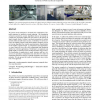Free Online Productivity Tools
i2Speak
i2Symbol
i2OCR
iTex2Img
iWeb2Print
iWeb2Shot
i2Type
iPdf2Split
iPdf2Merge
i2Bopomofo
i2Arabic
i2Style
i2Image
i2PDF
iLatex2Rtf
Sci2ools
SI3D
2016
ACM
2016
ACM
Adaptive impulse response modeling for interactive sound propagation
We present novel techniques to accelerate the computation of impulse responses for interactive sound rendering. Our formulation is based on geometric acoustic algorithms that use ray tracing to compute the propagation paths from each source to the listener in large, dynamic scenes. In order to accelerate generation of realistic acoustic effects in multi-source scenes, we introduce two novel concepts: the impulse response cache and an adaptive frequency-driven ray tracing algorithm that exploits psychoacoustic characteristics of the impulse response length. As compared to prior approaches, we trace relatively fewer rays while maintaining high simulation fidelity for real-time applications. Furthermore, our approach can handle highly reverberant scenes and high-dynamic-range sources. We demonstrate its application in many scenarios and have observed a 5x speedup in computation time and about two orders of magnitude reduction in memory overhead compared to previous approaches. We also p...
| Added | 09 Apr 2016 |
| Updated | 09 Apr 2016 |
| Type | Journal |
| Year | 2016 |
| Where | SI3D |
| Authors | Carl Schissler, Dinesh Manocha |
Comments (0)

